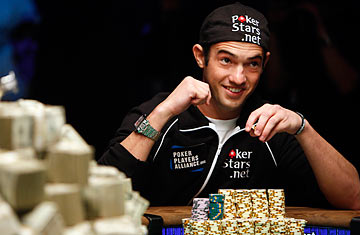
Joe Cada reacts after winning a hand against Darvin Moon during the World Series of Poker final table at the Rio Hotel & Casino in Las Vegas
This time last year, Joseph Cada couldn't legally order a cocktail. But today, the Shelby Township, Mich., native sits on top of the poker world as the champion of the World Series of Poker's "Main Event." Cada, who turns 22 next week, took home $8.5 million early Nov. 10 when he outlasted Maryland logger Darvin Moon (and 6,492 other competitors) at No-Limit Texas Hold 'Em to win the sport's biggest prize. TIME contributor Matt Villano caught up with Cada in Las Vegas to talk about preparing for the final table, what he's learned by playing poker online and what's next for history's youngest champ.
First off, how did you celebrate your monumental win last night?
Right after the match [at the Penn & Teller Theater inside the Rio Las Vegas] ended, there were like 2½ or 3 hours of interviews, photos, autographs and stuff like that. Then a bunch of us went back to our suite at the Palazzo. My family had come out to be with me, and I had about 100 friends who came out from Michigan to cheer me on too. We were up pretty late.
Starting today, how do you plan to represent poker as the new champion?
At this point, all I can say is that I'll do my best. Poker has been my life for a while now, so obviously I want to see it grow. Whatever the community needs me to do, I'll do. I'm psyched about the responsibility.
You've been playing professionally for six years. At what point in your career did you start thinking you could win the Main Event?
I had dreamed about it — I think every poker player does. But I always knew winning the Main Event was a big long shot. I mean, coming out on top of a field of 6,500 players is pretty rare. This summer [when the first eight days of the Main Event were played], once it got down to about 180 people, I started thinking that I might actually be able to do it. Then, when I made the final nine, I knew it was within reach.
With three months off before the final nine resumed play this weekend, how did you prepare?
I didn't really do anything special. I just continued the same lifestyle that had gotten me into the final nine. I played a lot of live events, both in person and online. I went out with friends — stuff a typical 21-year-old would do. I also traveled a lot and visited London and Barcelona.
Any regrets from the final table?
I'm pretty critical of how I play, and I'm not afraid to admit when I think I've played badly. When it got down to two of us, I had $135 million in chips, but I think Darvin definitely outplayed me at first. There was a point where he had me down to $40 million in chips. Thankfully, I came back. I knew if I just made good decisions, I could turn things around.
You shared final-table felt with poker legend Phil Ivey. Which longtime pros do you consider to be your mentors? And after whom would you say you've modeled your game?
Definitely Ivey. Tom Dwan. Both of these guys are so unpredictable that it's hard to put them on certain hands. What I've learned from them is that you have to play solid poker and keep people guessing at the same time. It's a powerful combination.
Peter Eastgate, then age 22, won this tournament last year, and you've taken the bracelet this year. To what extent do you think the "old guard" has been displaced by young guns?
I wouldn't say we've displaced them, but the Internet has certainly leveled the playing field. Playing cards is all about experience. Online, you can see 40 times as many hands in one hour as you would in a live game. Because of that, a 21-year-old could gain more experience in one year than someone who has been playing live for 25 years. You also don't need to go to a physical place to play — you can wake up and open up your laptop.
Legislators have made online poker illegal in the U.S. As someone who's played online for years, how do you see this issue being resolved?
I support the right to play poker online. Poker isn't gambling. It's a hobby, an activity, a game. It's not about luck — it's about logic, decision-making, math. We all should be able to play poker on the Web if we want to, and I believe that making it illegal strips us of our rights. This is an important issue, and hopefully we'll see it resolved soon.
$8.5 million is a lot of money. Short of going to Disneyland, what do you plan to do with it?
I haven't really thought about it yet. Since Saturday [when the field was winnowed down to two], I didn't want to look past the heads-up match with Darvin. I'm sure at least some of those winnings will go back into my bankroll, though. There's always another tournament to play.
ESPN's edited broadcast of the WSOP Main Event final table airs Nov. 10 at 9 p.m. ET.
